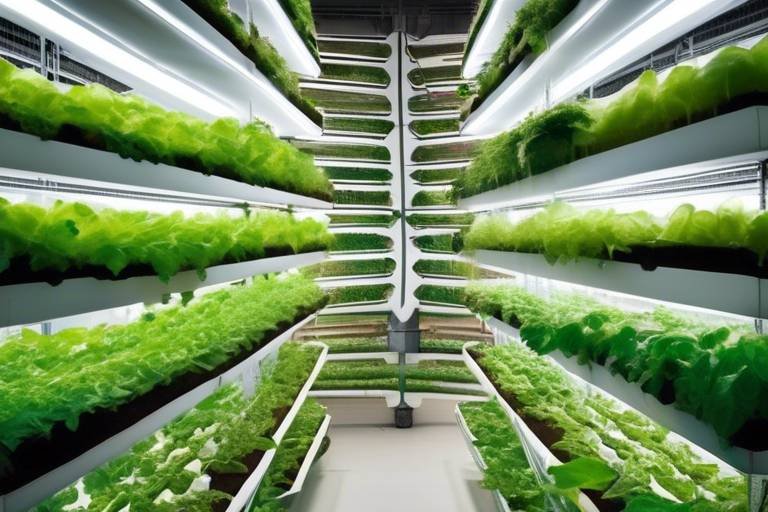How Can Local Markets Help Green Cities?
In today's fast-paced urban environments, the quest for sustainability has become more critical than ever. Local markets are not just charming spots for fresh produce; they are pivotal in transforming our cities into greener, more sustainable spaces. Imagine walking through a bustling market filled with vibrant fruits, vegetables, and artisanal goods, all sourced from nearby farms. This isn’t just a shopping experience; it’s a way to connect with your community and the environment. Local markets breathe life into neighborhoods, fostering relationships between residents and local producers, while simultaneously reducing our carbon footprint. But how exactly do these markets contribute to the creation of green cities? Let’s dive deeper!
Local markets are like the beating heart of a community, offering numerous benefits that extend far beyond just food. They play an essential role in promoting sustainability and environmental health. By supporting local economies, they help keep money within the community, which can lead to job creation and economic resilience. Additionally, these markets often feature products that are sourced regionally, which significantly reduces the need for long-distance transportation. This not only cuts down on carbon emissions but also ensures that consumers have access to fresh, seasonal produce. The ripple effect of local markets is profound, as they contribute to a more sustainable urban ecosystem.
One of the most significant advantages of local markets is their ability to reduce food miles. Food miles refer to the distance food travels from where it is produced to where it is consumed. By sourcing food locally, markets can dramatically decrease the transportation emissions associated with food distribution. Think about it: when you buy a tomato that has traveled hundreds of miles, you’re not just paying for the tomato itself; you're also paying for the fuel used to transport it. In contrast, when you purchase a tomato from a local farmer, you’re not only supporting your community but also minimizing the environmental impact. This reduction in food miles is crucial for creating a sustainable urban environment.
Local markets create a direct line between consumers and farmers. This connection is vital for encouraging sustainable agricultural practices. When consumers choose to buy from local markets, they are supporting farmers who prioritize environmentally friendly methods. This not only ensures that local producers receive fair compensation for their goods but also fosters a sense of accountability and transparency in food production. It’s like having a conversation with your farmer about how your food is grown, which builds trust and community spirit.
Many local markets prioritize organic produce, which is a significant step towards healthier eating habits. Organic farming reduces the use of harmful pesticides and fertilizers, contributing to a healthier ecosystem. When you choose organic products from local markets, you’re opting for food that is not only better for your health but also better for the planet. It’s a win-win situation! You get to enjoy delicious, nutritious food while supporting practices that protect the environment.
Local markets often feature a variety of products, which helps preserve biodiversity. By showcasing diverse crops, these markets encourage farmers to cultivate a range of plants rather than relying on monoculture practices. This diversity is essential for maintaining healthy ecosystems, as it promotes resilience against pests and diseases. Plus, it keeps our plates interesting with a wide array of flavors and textures. Who wouldn’t want to explore a rainbow of produce at their local market?
Local markets serve as vibrant community hubs where residents can connect, share resources, and participate in environmental initiatives. They foster a sense of belonging and collective responsibility among community members. Picture this: families gathering on weekends, chatting with their neighbors, sharing recipes, and learning about sustainable practices. This kind of community engagement not only strengthens social ties but also encourages individuals to take part in environmental advocacy. In essence, local markets are the glue that holds communities together while pushing for a greener future.
Many local markets implement waste reduction strategies, such as composting and recycling programs. These initiatives help minimize landfill contributions and promote a circular economy within urban settings. By encouraging consumers to think about waste, local markets are paving the way for a more sustainable lifestyle.
Markets that adopt zero-waste practices encourage consumers to bring their own containers, significantly reducing the reliance on single-use plastics. This shift towards sustainable consumption patterns is essential in today’s world, where plastic pollution is a growing concern. Imagine walking into a market where everyone brings their own bags and jars, creating a culture of sustainability. It’s not just about shopping; it’s about making conscious choices that benefit the environment.
Local markets often serve as platforms for educating the community about sustainability. They offer workshops and resources that empower individuals to make environmentally conscious choices in their daily lives. By participating in these educational initiatives, residents can learn about everything from composting to organic gardening. This knowledge is crucial for fostering a culture of sustainability, as it equips individuals with the tools they need to make a positive impact.
- What are local markets? Local markets are community-based marketplaces where residents can buy fresh produce, artisanal goods, and other products directly from local producers.
- How do local markets promote sustainability? They reduce food miles, support local farmers, encourage organic practices, and foster community engagement.
- Why is reducing food miles important? Reducing food miles minimizes transportation emissions, which is crucial for lowering the overall environmental impact of food distribution.
- What are zero-waste practices? Zero-waste practices encourage consumers to minimize waste by using reusable containers and reducing reliance on single-use plastics.

Benefits of Local Markets
This article explores the role of local markets in promoting sustainability and environmental health in urban areas, highlighting their benefits for communities, economies, and the planet.
Local markets are more than just a place to buy fresh produce; they are the beating heart of sustainable urban living. When you step into a local market, you're not just browsing through stalls; you’re participating in a movement that champions community engagement, boosts local economies, and significantly reduces our carbon footprints. These markets create a unique environment where consumers can directly support their local farmers and producers, making a tangible difference in their neighborhoods.
One of the most compelling benefits of local markets is their ability to foster community connections. Imagine walking through a bustling market, exchanging smiles and greetings with your neighbors, and chatting with the farmer who grew the tomatoes you’re about to buy. This sense of community is invaluable, as it cultivates relationships that strengthen social ties and promote a collective responsibility towards environmental health.
Moreover, local markets play a crucial role in supporting local economies. When you purchase goods from these markets, you're directly investing in your community. This not only helps local farmers and artisans thrive but also keeps money circulating within the local economy, which can lead to job creation and greater economic stability. According to studies, for every dollar spent at a local business, approximately 68 cents stays in the community, compared to just 43 cents for non-local businesses. This statistic highlights the profound impact local markets have on economic sustainability.
Additionally, local markets contribute to the reduction of our carbon footprints by promoting the sale of regionally sourced products. By sourcing food locally, we significantly decrease transportation emissions, which is vital for minimizing the environmental impact of food distribution in urban areas. This practice not only supports the local economy but also aligns with a growing consumer preference for fresh, local produce that travels shorter distances to reach our plates.
In essence, the benefits of local markets are multi-faceted. They promote sustainable practices, strengthen community bonds, and provide economic support, all while working towards a greener future. In a world where environmental concerns are increasingly pressing, local markets serve as a beacon of hope, reminding us that change can start right in our neighborhoods.
By sourcing food locally, markets significantly reduce transportation emissions, leading to a decrease in food miles, which is crucial for minimizing the environmental impact of food distribution in cities.
Local markets create direct connections between consumers and farmers, encouraging sustainable agricultural practices and ensuring that local producers receive fair compensation for their goods.
Many local markets prioritize organic produce, which not only supports healthier eating habits but also reduces the use of harmful pesticides and fertilizers, contributing to a healthier ecosystem.
By featuring a variety of local products, markets help preserve biodiversity, encouraging the cultivation of diverse crops and reducing reliance on monoculture farming practices.
Local markets serve as vibrant community hubs where residents can connect, share resources, and participate in environmental initiatives, fostering a sense of belonging and collective responsibility.
Many local markets implement waste reduction strategies, such as composting and recycling programs, which help minimize landfill contributions and promote a circular economy within urban settings.
Markets that adopt zero-waste practices encourage consumers to bring their own containers, reducing single-use plastics and promoting sustainable consumption patterns among urban dwellers.
Local markets often serve as platforms for educating the community about sustainability, offering workshops and resources that empower individuals to make environmentally conscious choices in their daily lives.
- What types of products can I find at local markets? Local markets typically offer a wide range of products, including fresh fruits and vegetables, meats, dairy, baked goods, and handcrafted items.
- How do local markets support sustainability? They reduce food miles, support local farmers, promote organic practices, and encourage community engagement.
- Can I participate in local markets as a vendor? Yes! Many local markets welcome new vendors. Check with your local market for application details.
- Are local markets more expensive than grocery stores? Prices can vary, but many find that local markets offer competitive prices, especially for fresh, seasonal produce.

Reducing Food Miles
In our fast-paced world, where convenience often takes precedence, the concept of food miles has emerged as a crucial topic in the discussion of sustainability. But what exactly are food miles? Simply put, food miles measure the distance food travels from its source to your plate. When you think about it, the longer the journey, the greater the environmental impact. By sourcing food locally, markets significantly reduce transportation emissions, leading to a decrease in food miles. This reduction is crucial for minimizing the environmental impact of food distribution in cities.
Imagine this: a tomato grown in your backyard travels mere feet to reach your kitchen, while another, grown thousands of miles away, has taken a long journey via trucks, planes, and ships. The latter not only contributes to greenhouse gas emissions but also requires energy-intensive refrigeration and packaging. By embracing local markets, we can change the narrative, opting for fresher produce that doesn’t need to endure long, costly journeys. This not only benefits our planet but also our taste buds, as locally sourced food is often harvested at its peak ripeness, ensuring maximum flavor.
Moreover, reducing food miles plays a vital role in supporting local economies. When you purchase from local markets, your money stays within the community, helping to create jobs and sustain local farmers. This creates a ripple effect that strengthens the local economy while also promoting a more sustainable food system. In fact, studies have shown that local food systems can reduce carbon emissions by up to 25% to 50% compared to conventional food systems. Isn't that an astonishing statistic?
To illustrate the impact of food miles, consider the following table:
| Type of Food | Distance Traveled (Miles) | Carbon Footprint (lbs CO2) |
|---|---|---|
| Locally Grown Tomato | 10 | 1.5 |
| Imported Tomato | 1,500 | 150 |
This table highlights the stark difference in both distance traveled and carbon footprint between locally grown and imported food. It's clear that every mile counts when it comes to our environmental responsibility.
Additionally, local markets often feature seasonal produce, which means that the food is harvested at the right time, further reducing the need for energy-consuming storage and transportation methods that are common with out-of-season imports. This seasonal approach not only helps reduce food miles but also encourages consumers to eat in harmony with nature, fostering a deeper connection to the food we consume.
In conclusion, reducing food miles is not just about cutting down on emissions; it's about fostering a sustainable, community-focused food system. By choosing local markets, we can enjoy fresher food, support our local economy, and contribute to a healthier planet. So, the next time you’re at a local market, remember that every purchase you make is a step towards a greener, more sustainable future.
- What are food miles? Food miles refer to the distance food travels from where it is produced to where it is consumed.
- Why are food miles important? They are important because they help us understand the environmental impact of our food choices, particularly in terms of greenhouse gas emissions.
- How can I reduce food miles in my diet? You can reduce food miles by shopping at local markets and choosing seasonal produce.
- What are the benefits of buying local? Buying local supports your community, reduces transportation emissions, and often provides fresher, tastier food.

Supporting Local Farmers
Local markets play a pivotal role in and fostering a sustainable agricultural ecosystem. When you step into a local market, you’re not just buying fresh produce; you’re forging a direct connection with the individuals who cultivate your food. This relationship is vital, as it encourages farmers to adopt sustainable agricultural practices that benefit both the environment and the community. By purchasing from local markets, consumers can help ensure that farmers receive fair compensation for their hard work, which is crucial in an industry often plagued by price volatility and corporate control.
Moreover, supporting local farmers can lead to a ripple effect throughout the community. When farmers thrive, they reinvest in their local economies. This means more jobs, better infrastructure, and a stronger community overall. It’s a win-win situation! Imagine a scenario where your favorite farmer’s market not only provides fresh vegetables but also contributes to local employment and community projects. It's like planting a seed that grows into a robust tree, providing shade and fruit for everyone in the neighborhood.
Local markets also encourage farmers to diversify their crops, moving away from monoculture practices that can deplete the soil and harm the ecosystem. By offering a variety of produce, local markets help maintain biodiversity and promote healthier ecosystems. For instance, when you see a colorful array of fruits and vegetables at your local market, you’re witnessing the fruits of diverse farming practices that prioritize the health of the land. This diversity not only benefits the environment but also enhances the culinary experiences of consumers, who can enjoy seasonal and unique flavors that supermarket chains often overlook.
In addition to direct sales, many local markets provide educational resources and workshops for farmers. These initiatives can include training on organic farming techniques, pest management, and sustainable practices that lead to higher yield and better quality produce. By equipping farmers with knowledge and resources, local markets empower them to thrive in an increasingly competitive landscape. The result? A community that champions sustainability and supports its local heroes—our farmers.
Ultimately, supporting local farmers is about more than just food; it's about creating a community that values health, sustainability, and connection. When you choose to shop at local markets, you’re not just making a purchase; you’re making a statement about what you value. You’re saying yes to fresh, nutritious food and no to the industrialized food system that often prioritizes profit over people and the planet. So, the next time you’re at a local market, take a moment to appreciate the hard work that goes into every item on display. It’s not just food; it’s a testament to community resilience and environmental stewardship.
- Why should I buy from local farmers? Buying from local farmers supports your community, ensures fresher produce, and promotes sustainable farming practices.
- How do local markets contribute to sustainability? Local markets reduce food miles, promote organic practices, and encourage biodiversity, all of which contribute to a healthier environment.
- What are some benefits of shopping at local markets? Benefits include fresher food, supporting local economies, and building community connections.

Promoting Organic Practices
In the heart of every thriving local market lies a commitment to organic practices that not only prioritize the health of consumers but also protect our precious environment. When shoppers choose organic produce, they are not just opting for tastier fruits and vegetables; they are actively participating in a movement that champions sustainability. Organic farming methods eschew synthetic pesticides and fertilizers, opting instead for natural alternatives that promote soil health and biodiversity. This is crucial because healthy soil leads to nutrient-rich crops, which are essential for our well-being.
Moreover, local markets often feature farmers who are deeply passionate about their craft, employing regenerative agriculture techniques that work in harmony with nature. These methods not only enhance the quality of the food we consume but also contribute to the overall health of our ecosystems. By purchasing from these markets, consumers are directly supporting farmers who prioritize sustainable practices over profit-driven methods that can harm the environment.
It's essential to recognize the ripple effect that promoting organic practices has on local economies. When consumers choose organic products, they are investing in their community. This creates a virtuous cycle where local farmers can thrive, leading to more job opportunities and a stronger economy. In fact, studies show that organic farming can create up to 30% more jobs compared to conventional farming. It’s a win-win scenario!
Additionally, local markets often provide a platform for education on the benefits of organic farming. Through workshops and demonstrations, they inform the community about how to grow their own organic gardens, which not only reduces reliance on store-bought produce but also fosters a deeper connection with the food we eat. Imagine walking through your neighborhood and seeing vibrant community gardens bursting with life, all thanks to the knowledge shared at your local market!
In essence, the promotion of organic practices within local markets is about more than just food; it’s about creating a sustainable future. By choosing organic, we are making a statement that we care about the health of our planet, our communities, and ourselves. So next time you visit a local market, take a moment to appreciate the organic options available to you and consider how your choices can contribute to a greener, healthier world.
- What are the benefits of buying organic produce?
Organic produce is often fresher and free from harmful chemicals, making it a healthier choice for you and the environment. - How does local sourcing reduce environmental impact?
Local sourcing minimizes transportation emissions, leading to a smaller carbon footprint and fresher products. - Can organic farming support local economies?
Yes! Organic farming creates more jobs and supports local farmers, boosting the economy. - What can I do to support organic practices?
Choose to shop at local markets, educate yourself about sustainable practices, and consider growing your own organic garden.

Encouraging Biodiversity
Local markets play a crucial role in by promoting a wide variety of locally grown products. When consumers choose to shop at these markets, they are not only supporting local farmers but also embracing a rich tapestry of agricultural practices that prioritize diversity over monoculture. This diversity is vital, as it helps to create resilient ecosystems that can withstand pests, diseases, and changing climate conditions.
By featuring a selection of seasonal fruits, vegetables, herbs, and grains, local markets provide consumers with the opportunity to explore and appreciate the unique flavors and nutritional benefits of various crops. This not only enhances the culinary experience but also encourages farmers to cultivate a wider range of produce, which can lead to healthier soil and ecosystems. For instance, a market that showcases heirloom tomatoes, rare varieties of squash, and indigenous grains fosters an appreciation for local agricultural heritage.
Moreover, local markets often serve as platforms for farmers to share their stories and practices with consumers. When shoppers learn about the methods used to grow their food, they become more invested in supporting practices that prioritize biodiversity. This connection not only strengthens the bond between consumers and producers but also raises awareness about the importance of preserving agricultural diversity. In this way, local markets act as educational hubs that empower individuals to make informed choices about the food they consume.
Another significant aspect of encouraging biodiversity is the promotion of permaculture and sustainable farming techniques. Many local markets collaborate with farmers who embrace these practices, which focus on working with nature rather than against it. This approach not only enhances biodiversity but also improves soil health and reduces the need for chemical inputs. By supporting these sustainable practices, local markets contribute to the overall health of the environment.
In summary, local markets are more than just places to buy fresh produce; they are vital components of a sustainable urban ecosystem. By encouraging biodiversity through diverse offerings, education, and sustainable practices, they help create a healthier environment for both people and the planet.
- What is biodiversity, and why is it important?
Biodiversity refers to the variety of life in a particular habitat or ecosystem. It is essential because it contributes to ecosystem resilience, supports food security, and enhances the overall health of the environment. - How do local markets support biodiversity?
Local markets support biodiversity by promoting a wide range of locally grown products, encouraging sustainable farming practices, and educating consumers about the importance of diverse crops. - Can shopping at local markets really make a difference?
Absolutely! Shopping at local markets helps reduce food miles, supports local economies, and promotes sustainable agricultural practices, all of which contribute to a greener planet.

Community Building
Local markets are more than just places to buy fresh produce; they are vibrant community hubs that foster connections among residents. Imagine walking through a bustling market, the air filled with the scent of fresh herbs and baked goods, where neighbors greet each other with smiles and laughter. These markets create an atmosphere that encourages social interactions, allowing people to engage in meaningful conversations and share experiences. It’s like a warm embrace that builds a sense of belonging, making everyone feel like they are part of something larger.
But what exactly makes these markets so special in terms of ? For starters, they provide a platform for local artisans, farmers, and vendors to showcase their products. This not only supports the local economy but also cultivates a sense of pride among residents. When people buy from their neighbors, they are investing in their community, which fosters a spirit of collaboration and mutual support. It’s a beautiful cycle where everyone benefits.
Moreover, local markets often host various community events such as cooking demonstrations, live music, and seasonal festivals. These events serve as a magnet, drawing people together and creating opportunities for them to bond over shared interests. Whether it’s learning how to cook a new dish or enjoying a local band, these gatherings transform the market into a lively social scene where relationships flourish. Just think about how attending a farmer's market can feel like a mini-vacation from the hustle and bustle of city life, bringing a sense of joy and relaxation.
Additionally, local markets can be a powerful catalyst for environmental initiatives. By bringing together like-minded individuals, they can inspire collective action on sustainability issues. For instance, markets might organize clean-up days or workshops on composting, encouraging residents to take part in preserving their environment. This not only enhances the community’s ecological footprint but also strengthens the bonds among participants, as they work together towards a common goal.
In essence, local markets are the heartbeat of the community. They not only provide access to fresh, local food but also create a space for social interaction, cultural exchange, and environmental stewardship. By participating in these markets, residents can forge connections that last a lifetime, transforming their neighborhoods into thriving, interconnected communities. So, the next time you visit a local market, take a moment to soak in the atmosphere. Engage with your neighbors, support local vendors, and be part of something special—because in the end, it’s all about building a stronger, more sustainable community.
- What are the main benefits of shopping at local markets? Shopping at local markets supports local economies, reduces carbon footprints, and promotes community engagement.
- How do local markets contribute to sustainability? They encourage the sale of regionally sourced products, reduce food miles, and promote organic and sustainable farming practices.
- Can local markets help in community building? Absolutely! They create spaces for social interactions, cultural exchanges, and collective environmental initiatives.
- What types of events do local markets typically host? Local markets often host cooking demonstrations, live music, seasonal festivals, and workshops on sustainability.

Waste Reduction Initiatives
In a world where waste is piling up faster than we can manage, local markets are stepping up as champions of sustainability. They are not just places to buy fresh produce; they are vibrant ecosystems dedicated to reducing waste and promoting environmental health. One of the most remarkable aspects of these markets is their commitment to implementing waste reduction strategies that not only benefit the environment but also engage the community in meaningful ways.
Many local markets have introduced innovative programs aimed at minimizing waste. For instance, composting initiatives allow organic waste to be transformed into nutrient-rich compost, which can then be used to enrich local soil. This cycle not only reduces the amount of waste sent to landfills but also supports local agriculture by providing farmers with high-quality compost. Imagine walking through a market and knowing that the scraps from your favorite vendor are being turned into something that nourishes the earth! It’s a beautiful synergy that highlights how local markets can be part of a larger environmental solution.
Additionally, recycling programs are becoming a staple in many local markets. These programs encourage both vendors and customers to think critically about their waste. For example, some markets have set up designated recycling stations where shoppers can separate their recyclables, ensuring that materials like glass, plastic, and paper are processed correctly. This not only reduces contamination but also raises awareness about the importance of recycling. It’s like turning a chore into a community event, where everyone plays a part in making the world a little cleaner.
Furthermore, many local markets are adopting zero-waste practices. This means encouraging consumers to bring their own reusable containers for purchases, whether it’s fresh produce, bulk grains, or even prepared foods. By reducing single-use plastics, these markets are not only cutting down on waste but also promoting a culture of sustainability among urban dwellers. Imagine walking into a market where everyone is proudly using their own bags and containers—it creates a sense of community and shared responsibility that resonates with everyone involved.
Education plays a crucial role in these waste reduction initiatives. Local markets often serve as platforms for raising awareness about sustainability. They host workshops and provide resources that empower individuals to make environmentally conscious choices in their daily lives. Whether it’s learning how to compost at home or understanding the impact of food waste, these educational efforts are essential for fostering a culture of sustainability. After all, knowledge is power, and when people are informed, they are more likely to make choices that benefit the planet.
In conclusion, local markets are not just about buying and selling; they are pivotal in driving waste reduction initiatives that benefit both the community and the environment. By implementing composting and recycling programs, adopting zero-waste practices, and prioritizing education, these markets are setting a powerful example of how local efforts can lead to significant environmental change. The next time you visit a local market, take a moment to appreciate the larger impact of your shopping choices. Together, we can cultivate greener cities, one market at a time.
- What are waste reduction initiatives? Waste reduction initiatives are strategies and programs designed to minimize waste production and promote recycling and composting.
- How do local markets contribute to waste reduction? Local markets implement composting, recycling, and zero-waste practices that engage the community and reduce environmental impact.
- Why is it important to reduce waste? Reducing waste helps to conserve resources, protect the environment, and promote sustainable living practices.
- Can I participate in waste reduction at my local market? Absolutely! You can bring your own reusable containers, participate in recycling programs, and engage in educational workshops.

Zero-Waste Practices
This article explores the role of local markets in promoting sustainability and environmental health in urban areas, highlighting their benefits for communities, economies, and the planet.
Local markets foster community engagement, support local economies, and reduce carbon footprints by promoting the sale of regionally sourced products, thus contributing to greener urban environments.
By sourcing food locally, markets significantly reduce transportation emissions, leading to a decrease in food miles, which is crucial for minimizing the environmental impact of food distribution in cities.
Local markets create direct connections between consumers and farmers, encouraging sustainable agricultural practices and ensuring that local producers receive fair compensation for their goods.
Many local markets prioritize organic produce, which not only supports healthier eating habits but also reduces the use of harmful pesticides and fertilizers, contributing to a healthier ecosystem.
By featuring a variety of local products, markets help preserve biodiversity, encouraging the cultivation of diverse crops and reducing reliance on monoculture farming practices.
Local markets serve as vibrant community hubs where residents can connect, share resources, and participate in environmental initiatives, fostering a sense of belonging and collective responsibility.
Many local markets implement waste reduction strategies, such as composting and recycling programs, which help minimize landfill contributions and promote a circular economy within urban settings.
In the quest for sustainability, have emerged as a beacon of hope in local markets. These practices aim to eliminate waste by encouraging consumers to rethink their purchasing habits. Imagine walking into a local market where the air is filled with the scent of fresh produce, and instead of single-use plastic bags, you see customers proudly carrying their own reusable containers. This is not just a dream; it’s becoming a reality in many communities.
Zero-waste markets often implement several strategies to minimize waste:
- Reusable Containers: Shoppers are encouraged to bring their own bags, jars, and containers, which significantly cuts down on plastic waste.
- Bulk Buying Options: Many markets offer bulk bins for grains, nuts, and spices, allowing customers to purchase only what they need, reducing packaging waste.
- Composting Programs: Leftover produce and organic materials are composted rather than thrown away, enriching the soil and reducing landfill contributions.
These practices not only help the environment but also foster a sense of community. When people come together to support sustainable practices, they create a culture of awareness and responsibility. Local markets become places where education and action intersect, empowering individuals to make choices that benefit both their health and the planet.
Q: What are zero-waste practices?
A: Zero-waste practices aim to reduce waste to the absolute minimum by rethinking consumption habits, promoting reusable containers, and encouraging composting.
Q: How can I participate in zero-waste practices at my local market?
A: You can participate by bringing your own reusable bags and containers, buying in bulk, and supporting vendors who prioritize sustainable packaging.
Q: What are the benefits of shopping at local markets?
A: Shopping at local markets supports local economies, reduces carbon footprints, and fosters community connections while promoting sustainable practices.

Education and Awareness
Local markets are not just places to buy fresh produce; they are vibrant educational hubs that play a crucial role in raising awareness about sustainability. Imagine strolling through a bustling market, the air filled with the scent of fresh herbs and ripe fruits, while vendors passionately share their knowledge about the origins of their products. This interaction fosters a deeper understanding of where our food comes from and the environmental impact of our choices.
Many local markets host workshops that cover a variety of topics related to sustainability. These sessions might include how to start a home garden, the importance of composting, or even cooking demonstrations that emphasize using seasonal ingredients. By engaging the community in these hands-on experiences, markets empower individuals to adopt more sustainable practices in their everyday lives. For instance, a workshop on composting can help residents learn how to reduce waste at home, thus contributing to a healthier urban environment.
Moreover, local markets often collaborate with environmental organizations to provide resources and information about sustainable living. This partnership can take many forms, such as distributing educational pamphlets, hosting guest speakers, or even organizing community clean-up events. By creating a platform for these initiatives, markets help to cultivate a culture of environmental stewardship among residents.
To illustrate the impact of education in local markets, consider the following table that outlines some common educational initiatives:
| Initiative | Description | Benefits |
|---|---|---|
| Workshops | Hands-on sessions teaching sustainable practices | Empowers individuals, promotes community engagement |
| Guest Speakers | Experts sharing knowledge on sustainability | Increases awareness, inspires action |
| Resource Distribution | Providing pamphlets and guides on sustainable living | Educates the community, encourages informed choices |
| Community Events | Organizing clean-ups and sustainability fairs | Builds community spirit, promotes collective responsibility |
Through these educational efforts, local markets not only provide fresh, healthy food but also act as catalysts for change, inspiring individuals to adopt more sustainable lifestyles. The ripple effect of this education can lead to a more informed community that values sustainability and actively participates in creating a greener city.
- What types of workshops are typically offered at local markets?
Local markets often offer workshops on gardening, composting, cooking with seasonal ingredients, and other sustainable practices. - How can I get involved in educational initiatives at my local market?
You can check with your local market for upcoming events, volunteer opportunities, or ways to participate in workshops. - Are local markets more expensive than grocery stores?
While some products may be priced higher, many local markets offer competitive prices on fresh produce and unique items, plus the added benefit of supporting local farmers. - Can local markets help reduce my carbon footprint?
Yes! By sourcing food locally and reducing transportation emissions, local markets significantly lower your food miles, contributing to a greener environment.
Frequently Asked Questions
- How do local markets contribute to greener cities?
Local markets play a pivotal role in promoting sustainability by providing residents with access to regionally sourced products. This not only supports the local economy but also reduces transportation emissions, leading to a smaller carbon footprint. By prioritizing local goods, these markets help create a more sustainable urban environment.
- What are food miles and why are they important?
Food miles refer to the distance food travels from where it's produced to where it's consumed. Reducing food miles is crucial because it minimizes transportation emissions, which are a significant contributor to climate change. Local markets help cut down on food miles by connecting consumers directly with local farmers, ensuring fresher produce and a lower environmental impact.
- How do local markets support farmers?
Local markets create a direct link between consumers and farmers, allowing producers to sell their goods without intermediaries. This not only ensures that farmers receive fair compensation but also encourages sustainable agricultural practices. By supporting local farmers, markets help foster a healthier food system and promote regional biodiversity.
- What is the significance of organic practices in local markets?
Many local markets emphasize organic produce, which is grown without harmful pesticides and fertilizers. This approach not only benefits consumer health but also contributes to a healthier ecosystem by reducing chemical runoff and promoting soil health. By choosing organic products, consumers support sustainable farming practices and a greener environment.
- How do local markets foster community building?
Local markets serve as vibrant community hubs where residents can gather, share resources, and participate in environmental initiatives. They encourage social interaction and a sense of belonging, fostering a collective responsibility towards sustainability. By participating in market activities, individuals can connect with their neighbors and engage in meaningful conversations about environmental issues.
- What waste reduction initiatives are implemented by local markets?
Many local markets adopt waste reduction strategies, such as composting and recycling programs, to minimize landfill contributions. Some markets encourage zero-waste practices by urging consumers to bring their own containers, significantly reducing single-use plastics. These initiatives promote a circular economy and help educate the community about the importance of waste management.
- How do local markets educate the community about sustainability?
Local markets often host workshops and provide resources that empower individuals to make environmentally conscious choices. By offering educational programs, they raise awareness about sustainability issues and promote better practices among consumers. This education is vital for fostering a culture of sustainability within the community.



















